外研版(2019)必修一 Unit2 Exploring English Starting out 课件(52张PPT)
文档属性
| 名称 | 外研版(2019)必修一 Unit2 Exploring English Starting out 课件(52张PPT) | 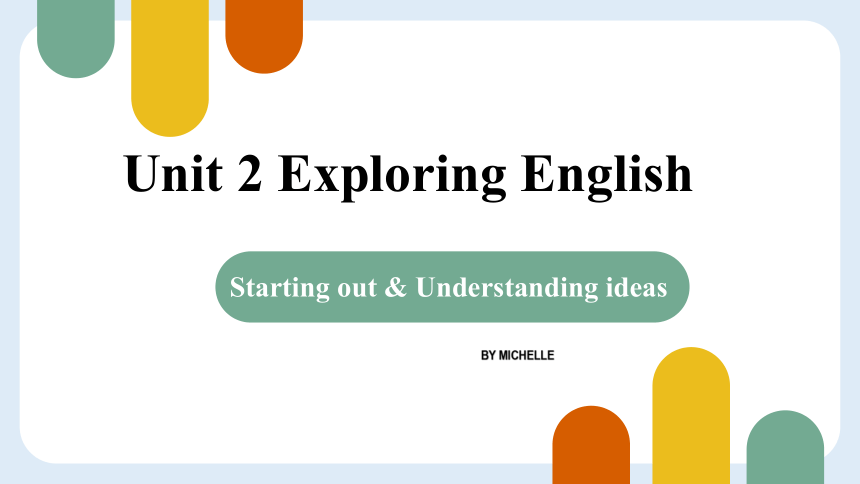 | |
| 格式 | pptx | ||
| 文件大小 | 69.4MB | ||
| 资源类型 | 教案 | ||
| 版本资源 | 外研版(2019) | ||
| 科目 | 英语 | ||
| 更新时间 | 2025-01-10 15:04:08 | ||
图片预览


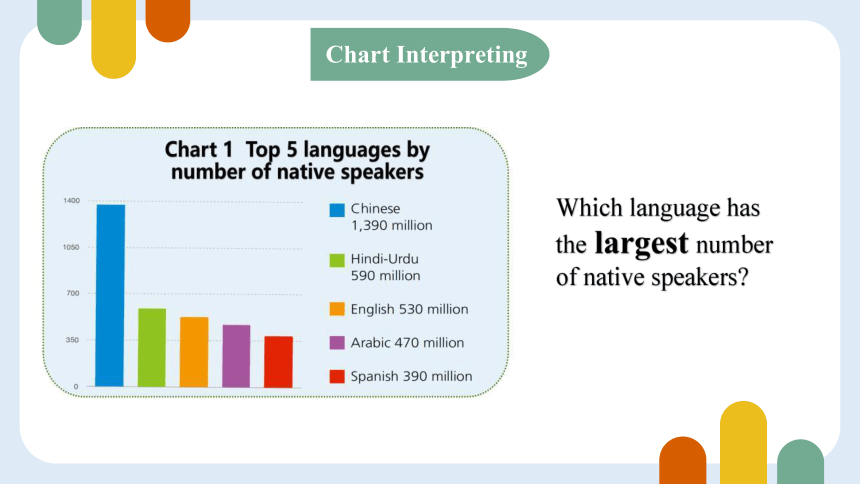
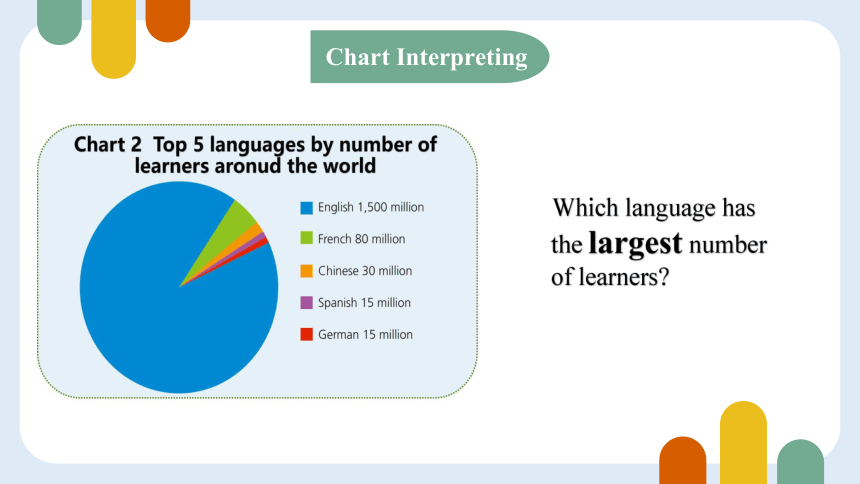
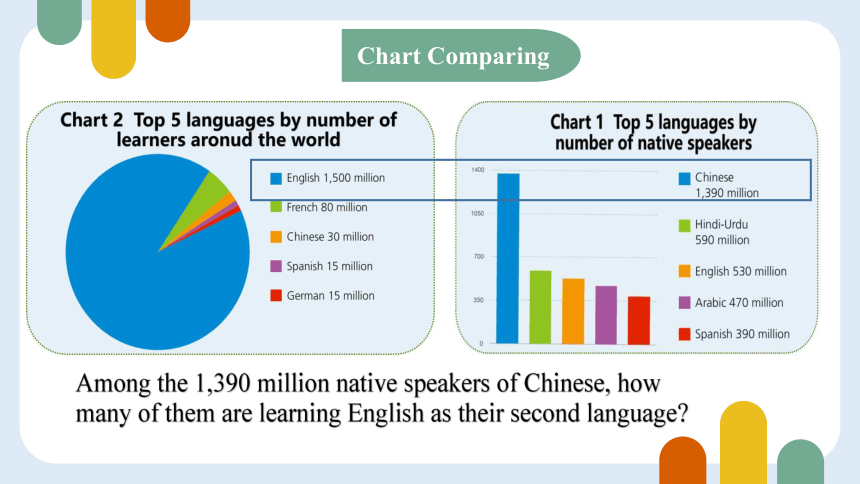



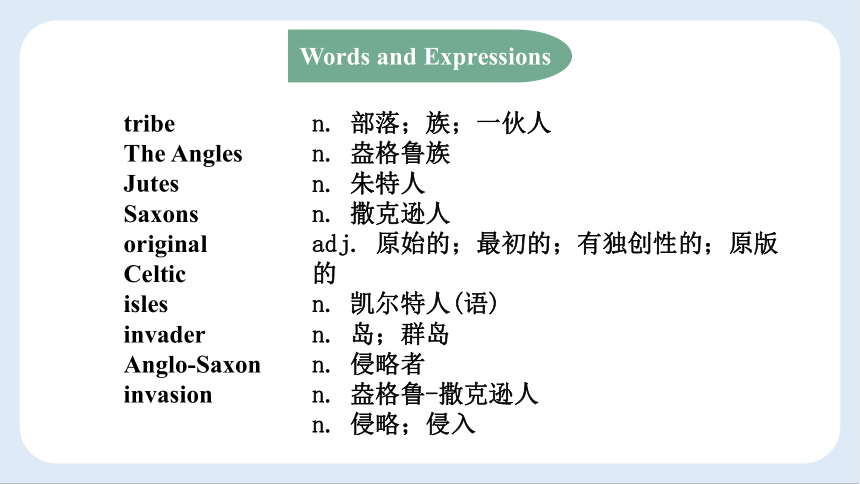


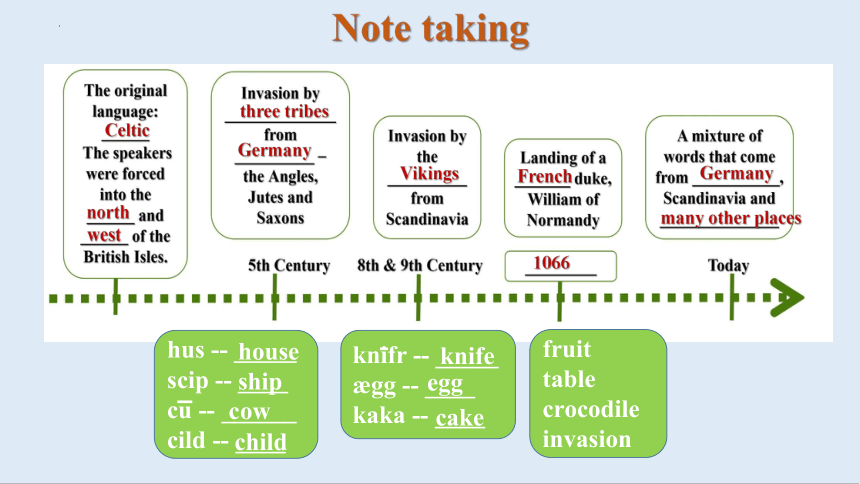
文档简介
(共52张PPT)
Starting out & Understanding ideas
Unit 2 Exploring English
BY MICHELLE
课程导入
1. Among the different languages, which one are you best at
2. Which one do you think has the largest number of native speakers
Leading in
Enjoy the video and answer the following questions.
课程导入
Which language has the largest number of native speakers
Chart Interpreting
课程导入
Which language has the largest number of learners
Chart Interpreting
课程导入
Among the 1,390 million native speakers of Chinese, how many of them are learning English as their second language
Chart Comparing
课程导入
What conclusion can you draw from Chart 3
Chart Infering
Complete the table according to Chart 3
课程导入
Further Thinking
1. Why do more and more Chinese learn English
2. Will this trend continue in future
3. Why has English, instead of other languages, become the global language nowadays
4. What characteristic does English have as a global language
Video Predicting
课程导入
课程导入
1. What comes to your mind first when talking about history of English
2. What order will be used when talking about the events through the history of English
tribe
The Angles
Jutes
Saxons
original
Celtic
isles
invader
Anglo-Saxon
invasion
n. 部落;族;一伙人
n. 盎格鲁族
n. 朱特人
n. 撒克逊人
adj. 原始的;最初的;有独创性的;原版的
n. 凯尔特人(语)
n. 岛;群岛
n. 侵略者
n. 盎格鲁-撒克逊人
n. 侵略;侵入
Words and Expressions
Words and Expressions
Vikings
Scandinavia
duke
Hastings
estimate
mixture
n. 维京人;北欧海盗
n. 斯堪的纳维亚
n. 公爵
n. 黑斯廷斯(英国港市)
v. 估计;估价;评价
n. 混合;混合物
课程导入
1. Which countries mentioned in the video have English as their first language
2. Where do a third of English words come from What examples are given in the video
Leading in
Watch the video and answer the questions
Note taking
hus -- _____
scip -- ____
cu -- ______
cild -- ____
knifr -- _____
gg -- ____
kaka -- ____
Celtic
north
west
three tribes
Germany
Vikings
1066
French
Germany
many other places
house
ship
cow
child
knife
egg
cake
fruit
table
crocodile
invasion
课程导入
In history, invasions shaped part of English language. But at present days, what contributes to the development of English language
Explore the topic further
1. native speaker
2. invasion
3. invader
4. tribe
5. original
6. a third
7. ahead of
8. It has been estimated that
讲本族语的人;母语使用者
武装入侵;侵略;侵犯
侵略者
部落
原来的;起初的;最早的
三分之一
早于;领先;在---前面
据估计
Review
Have you got the tips to interpret charts
Can you retell the history of English
What do you think of the development of English in the future
Self-evaluation
Neither Pine nor Apple in Pineapple
Understanding ideas
Lead in
Today Exploring
Welcome to Today Exploring. I’m Cindy. Today’s topic is exploring the secrets of English.
I’m Sam. Cindy, do you know there are many interesting phenomenon in language
老婆饼
蚂蚁上树
松鼠桂鱼
夫妻肺片
鱼香肉丝
In Chinese
sweetbreads
sweetmeats
hamburger
eggplant
pineapple
In English
Pre-reading
Look at the title of the passage and the pictures. What do you think the passage is about
While-reading
Choose the author’s purpose in writing the passage.
1. To tell us that English is very difficult to learn.
2. To give advice on how to learn English.
3. To show that English is interesting and creative.
4. To explain how English was created.
While-reading
Para.________
main idea: _________________________
Para.________
main idea: _________________________
Para.________
main idea: _________________________
Divide the passage into 3 parts, and find the main idea of each part.
Part 1
Part 2
Part 3
1
2-6
7
English is a crazy language to learn.
The author gives examples of crazy phenomena in English.
English reflects the creativity of human race.
Why is it a crazy language
Go through Para1 and fill in the blanks
Some Examples
no ham in .
no egg in .
neither pine nor apple in .
eggplant
hamburger
pineapple
Why is it a crazy language
Read Para2 and fill in the blanks
Some Examples
sculpt a ;
paint a ;
BUT a photo.
sculpture
painting
take
seasick at ;
carsick in a ;
airsick in the ;
homesick
feel ill when we get back home
feel ill when we miss home
sea
car
air
Why is it a crazy language
Read para3
hard soft
hardly softly
The damp(潮湿的) air contains much water.
The desert air contains hardly any water.
Why is it a crazy language
Read para3
harmless
harmful
shameless ==
shameful
different
the same
Why is it a crazy language
Read para4 about the whether
rain
snow
sunshine
It’s raining.
It’s snowing.
The sun is shining.
It’s sunny.
Why is it a crazy language
WHO
IT
Information Technology
US
United States
Even the shortest words can be confusing.
You also have to wonder at the unique madness of a language in which a house can burn up as it burns down, in which you fill in a form by filling it out, and in which an alarm is only heard once it goes off!
burn up == burn down
fill in == fill out
alarm goes off
Read Para6 and pay attention to the words in red
When I wind up my watch, it starts.
When I wind up this passage, it ends.
make a clock or other device operate by turning a handle or key
wind up a watch
finish a passage or stop doing it
wind up a passage
Read Para7 and think of different meanings of wind up
Why is English a crazy language
Reason:
English was invented by people, not computers, and it reflects the creativity of the human race.
Group work ~
Can you think of more examples
proving that English is a crazy language
1. Teacher is the person who teaches.
Writer is the person who writes.
But...
2. What is a freshman A man who is fresh What about butterfly and icecream
3. What’s the difference between “on the tree” and “in the tree”
...
While-reading
Complete the notes with words from the passage.
hamburger
pineapple
painting
airsick
carsick
homesick
opposing
behaviors
out
invisible
ends
unique
● How did pineapples, hamburgers and eggplants get their names
Cultural Knowledge
Watch the video ~
1. Do you agree with the author’s opinion about the English language Give your reasons.
Discussion
阐述观点:
From my point,/In my opinion,/As far as I am concerned, ......
I’m with sb. on that.
I have the same opinion.
I agree with sb./I don’t agree with sb.
Post-reading
2. What do you find most challenging about learning English How do you deal with this
As to me/Personally, I find it hard to write in an elegant way. When I write, it is challenging to organize my sentences together.
It is essential to take effective ways to solve the problem. On the one hand, I spend enough time in practicing English. Don’t be afraid of making mistakes. On the other hand, reading English magazines is also a good way. To sum up, it is not easy to learn English. But we can take measures to make it easier.
Discussion
Post-reading
Summary
English
crazy,
unique
a reflection of creativity
be positive
Language points
Have you ever asked yourself why people often have trouble learning English
have trouble/difficulty with sth. /(in) doing sth. 做某事费劲, 有困难
have a problem/problems with sth. / (in) doing sth. 在……方面/做某事有问题
have a good/hard time with sth. / (in) doing sth. 在……方面有快乐/艰难时光
【即学活用】
(1)语法填空
①I have some trouble _______(read) the letter, because his handwriting is bad.
②If you go to school lacking sleep, you might have problems ____your memory.
(2)I think we will ______________________________.
我觉得我们很难买到票。
reading
with
have a hard time getting tickets
Neither is there pine nor apple in pineapple.
句中neither . . . nor . . . 意为“既不……也不……”, 可连接两个平行结构。
*如果neither或nor置于句首时采用部分倒装。
*neither . . . nor . . . 连接两个主语时, 谓语动词的单复数取决于与谓语最近的主语, 即就近原则。
【即学活用】
(1)语法填空
①Neither his parents nor he ______(like) eating meat.
②Neither did Peter want the responsibility, ______did his wife.
(2)用neither. . . nor进行同义句转换
The parents were not satisfied with the result and their son wasn’t either.
→____________________________________satisfied with the result.
Language points
likes
nor
Neither the parents nor their son was
Language points
When we look out of the window and see rain or snow, we can say “it’s raining”or “it’s snowing.”
look out of 从……往外看 look out 当心(不及物动词短语, 后不接宾语)
look out for 当心, 注意(及物动词短语, 后必须接宾语)
look down on/upon 看不起, 轻视 look up to 尊敬
【即学活用】用look相关短语的适当形式填空
(1)If you __________the window on the left of the bus, you’ll see that we’re now approaching the Tower of London.
(2) ________! A truck’s coming! Get out of the way.
(3)Do ___________spelling mistakes in your homework.
(4)I _________him because he’s a real artist.
look out of
Look out
look out for
look up to
Language points
Even the smallest words can be confusing.
(1)confused adj. 困惑的, 不解的
be confused about/by 对……感到困惑
(2)confuse vt. 使困惑, 打乱, 混淆
confuse sb. /sth. with 把……与……混淆
【即学活用】用confuse的适当形式填空
(1)It is very _________to learn a new language.
(2)People are ________about all the different labels on food these days.
(3)From his ________look on his face, the father knew his poor son didn’t come up with a reason why he had to stay at school all day long.
confusing
confused
confused
Language points
What about “IT” and “US”
What about. . . 与How about. . . 同义, 意为“……怎么样 ”
(1)向对方提出建议或请求;
(2)征询对方的看法或意见;
(3)询问天气或身体等情况。
*What about going for a picnic this weekend
*How about going shopping and seeing a show in London
Language points
You also have to wonder...in which a house can burn up as it burns down.
burn up 烧毁, 烧尽: (大量)消耗; (火)旺起来; 发烧
burn. . . to the ground 烧毁, 夷为平地
burn. . . to ashes 把……烧成灰烬
【即学活用】
(1)The house was ________before the firemen got there. 屋子在消防队员赶到前被烧光了。
(2)They threatened to __________our house. 他们威胁要烧毁我们的房子。
(3)语法填空
①The village ___________(burn) down to the ground during the war.
②The house was burnt down ____ashes overnight.
burnt up
burn down
was burnt
to
Language points
...in which you fill in a form by filling it out.
fill out 填写, 填入
fill. . . (up) with. . . 把……用……充满
be filled with/be full of 充满(表状态)
【即学活用】语法填空
(1)He is full ____concern about his sick mother.
(2)When you get a job, you should fill ________a form first.
(3)She turned away so that no one might see that her eyes were filled______tears.
(4)Last week, I met a friend at a hall ________(fill) with people.
of
in/out
with
filled
Language points
... in which an alarm is only heard once it goes off!
(1)raise/sound the alarm 发出警报; 报警
in alarm 惊恐地
(2)be alarmed at/by . . . 对……感到忧虑或害怕
be alarmed to do sth. 害怕做某事
【即学活用】
①The enemy commander was alarmed _______(learn)that his troops had been surrounded.
②Local residents have been alarmed _____the recent police activity.
(2)They first ___________________________about the problem of nuclear waste in 1955.
他们在1955年首次对核废料的问题发出警报。
to learn
by/at
sounded/raised the alarm
Language points
... and it reflects the creativity of the human race.
【即学活用】
(1)用create的适当形式填空
①He was without doubt the _______of the Roman Empire.
②Do you have any ideas You’re the _______one.
③There is no software development without _________.
(2)The government plans to _______________for young people.
政府计划为年轻人创造更多的就业机会。
creator
creative
creativity
create more jobs
Language points
That is why when the stars are out, they are visible, but when the lights are out, they are invisible.
That/This/It is why. . . 句中why引导表语从句。
It/This/That is why. . . 这/那就是为什么……, 后接结果。
It/This/That is because. . . 这/那就是因为……, 后接原因。
【即学活用】(1)选词填空(because/why)
①He was caught in a traffic jam. It was ____he was late for the meeting.
②He wants to find another job; this is _______he can’t put up with the pressure here any more.
(2)句型转换 The reason why he was given a warning was that he was late for school again.
→He was given a warning. _____ ____ _______he was late for school again.
→He was late for school again. _____ ____ ____he was given a warning.
why
because
That was because
That was why
Homework
Introduce the history of Chinese characters to your foreign friend Tom who is learning Chinese. You can get information on the Internet and sort it out by drawing a timeline.
THANKS FOR WATCHING
Starting out & Understanding ideas
Unit 2 Exploring English
BY MICHELLE
课程导入
1. Among the different languages, which one are you best at
2. Which one do you think has the largest number of native speakers
Leading in
Enjoy the video and answer the following questions.
课程导入
Which language has the largest number of native speakers
Chart Interpreting
课程导入
Which language has the largest number of learners
Chart Interpreting
课程导入
Among the 1,390 million native speakers of Chinese, how many of them are learning English as their second language
Chart Comparing
课程导入
What conclusion can you draw from Chart 3
Chart Infering
Complete the table according to Chart 3
课程导入
Further Thinking
1. Why do more and more Chinese learn English
2. Will this trend continue in future
3. Why has English, instead of other languages, become the global language nowadays
4. What characteristic does English have as a global language
Video Predicting
课程导入
课程导入
1. What comes to your mind first when talking about history of English
2. What order will be used when talking about the events through the history of English
tribe
The Angles
Jutes
Saxons
original
Celtic
isles
invader
Anglo-Saxon
invasion
n. 部落;族;一伙人
n. 盎格鲁族
n. 朱特人
n. 撒克逊人
adj. 原始的;最初的;有独创性的;原版的
n. 凯尔特人(语)
n. 岛;群岛
n. 侵略者
n. 盎格鲁-撒克逊人
n. 侵略;侵入
Words and Expressions
Words and Expressions
Vikings
Scandinavia
duke
Hastings
estimate
mixture
n. 维京人;北欧海盗
n. 斯堪的纳维亚
n. 公爵
n. 黑斯廷斯(英国港市)
v. 估计;估价;评价
n. 混合;混合物
课程导入
1. Which countries mentioned in the video have English as their first language
2. Where do a third of English words come from What examples are given in the video
Leading in
Watch the video and answer the questions
Note taking
hus -- _____
scip -- ____
cu -- ______
cild -- ____
knifr -- _____
gg -- ____
kaka -- ____
Celtic
north
west
three tribes
Germany
Vikings
1066
French
Germany
many other places
house
ship
cow
child
knife
egg
cake
fruit
table
crocodile
invasion
课程导入
In history, invasions shaped part of English language. But at present days, what contributes to the development of English language
Explore the topic further
1. native speaker
2. invasion
3. invader
4. tribe
5. original
6. a third
7. ahead of
8. It has been estimated that
讲本族语的人;母语使用者
武装入侵;侵略;侵犯
侵略者
部落
原来的;起初的;最早的
三分之一
早于;领先;在---前面
据估计
Review
Have you got the tips to interpret charts
Can you retell the history of English
What do you think of the development of English in the future
Self-evaluation
Neither Pine nor Apple in Pineapple
Understanding ideas
Lead in
Today Exploring
Welcome to Today Exploring. I’m Cindy. Today’s topic is exploring the secrets of English.
I’m Sam. Cindy, do you know there are many interesting phenomenon in language
老婆饼
蚂蚁上树
松鼠桂鱼
夫妻肺片
鱼香肉丝
In Chinese
sweetbreads
sweetmeats
hamburger
eggplant
pineapple
In English
Pre-reading
Look at the title of the passage and the pictures. What do you think the passage is about
While-reading
Choose the author’s purpose in writing the passage.
1. To tell us that English is very difficult to learn.
2. To give advice on how to learn English.
3. To show that English is interesting and creative.
4. To explain how English was created.
While-reading
Para.________
main idea: _________________________
Para.________
main idea: _________________________
Para.________
main idea: _________________________
Divide the passage into 3 parts, and find the main idea of each part.
Part 1
Part 2
Part 3
1
2-6
7
English is a crazy language to learn.
The author gives examples of crazy phenomena in English.
English reflects the creativity of human race.
Why is it a crazy language
Go through Para1 and fill in the blanks
Some Examples
no ham in .
no egg in .
neither pine nor apple in .
eggplant
hamburger
pineapple
Why is it a crazy language
Read Para2 and fill in the blanks
Some Examples
sculpt a ;
paint a ;
BUT a photo.
sculpture
painting
take
seasick at ;
carsick in a ;
airsick in the ;
homesick
feel ill when we get back home
feel ill when we miss home
sea
car
air
Why is it a crazy language
Read para3
hard soft
hardly softly
The damp(潮湿的) air contains much water.
The desert air contains hardly any water.
Why is it a crazy language
Read para3
harmless
harmful
shameless ==
shameful
different
the same
Why is it a crazy language
Read para4 about the whether
rain
snow
sunshine
It’s raining.
It’s snowing.
The sun is shining.
It’s sunny.
Why is it a crazy language
WHO
IT
Information Technology
US
United States
Even the shortest words can be confusing.
You also have to wonder at the unique madness of a language in which a house can burn up as it burns down, in which you fill in a form by filling it out, and in which an alarm is only heard once it goes off!
burn up == burn down
fill in == fill out
alarm goes off
Read Para6 and pay attention to the words in red
When I wind up my watch, it starts.
When I wind up this passage, it ends.
make a clock or other device operate by turning a handle or key
wind up a watch
finish a passage or stop doing it
wind up a passage
Read Para7 and think of different meanings of wind up
Why is English a crazy language
Reason:
English was invented by people, not computers, and it reflects the creativity of the human race.
Group work ~
Can you think of more examples
proving that English is a crazy language
1. Teacher is the person who teaches.
Writer is the person who writes.
But...
2. What is a freshman A man who is fresh What about butterfly and icecream
3. What’s the difference between “on the tree” and “in the tree”
...
While-reading
Complete the notes with words from the passage.
hamburger
pineapple
painting
airsick
carsick
homesick
opposing
behaviors
out
invisible
ends
unique
● How did pineapples, hamburgers and eggplants get their names
Cultural Knowledge
Watch the video ~
1. Do you agree with the author’s opinion about the English language Give your reasons.
Discussion
阐述观点:
From my point,/In my opinion,/As far as I am concerned, ......
I’m with sb. on that.
I have the same opinion.
I agree with sb./I don’t agree with sb.
Post-reading
2. What do you find most challenging about learning English How do you deal with this
As to me/Personally, I find it hard to write in an elegant way. When I write, it is challenging to organize my sentences together.
It is essential to take effective ways to solve the problem. On the one hand, I spend enough time in practicing English. Don’t be afraid of making mistakes. On the other hand, reading English magazines is also a good way. To sum up, it is not easy to learn English. But we can take measures to make it easier.
Discussion
Post-reading
Summary
English
crazy,
unique
a reflection of creativity
be positive
Language points
Have you ever asked yourself why people often have trouble learning English
have trouble/difficulty with sth. /(in) doing sth. 做某事费劲, 有困难
have a problem/problems with sth. / (in) doing sth. 在……方面/做某事有问题
have a good/hard time with sth. / (in) doing sth. 在……方面有快乐/艰难时光
【即学活用】
(1)语法填空
①I have some trouble _______(read) the letter, because his handwriting is bad.
②If you go to school lacking sleep, you might have problems ____your memory.
(2)I think we will ______________________________.
我觉得我们很难买到票。
reading
with
have a hard time getting tickets
Neither is there pine nor apple in pineapple.
句中neither . . . nor . . . 意为“既不……也不……”, 可连接两个平行结构。
*如果neither或nor置于句首时采用部分倒装。
*neither . . . nor . . . 连接两个主语时, 谓语动词的单复数取决于与谓语最近的主语, 即就近原则。
【即学活用】
(1)语法填空
①Neither his parents nor he ______(like) eating meat.
②Neither did Peter want the responsibility, ______did his wife.
(2)用neither. . . nor进行同义句转换
The parents were not satisfied with the result and their son wasn’t either.
→____________________________________satisfied with the result.
Language points
likes
nor
Neither the parents nor their son was
Language points
When we look out of the window and see rain or snow, we can say “it’s raining”or “it’s snowing.”
look out of 从……往外看 look out 当心(不及物动词短语, 后不接宾语)
look out for 当心, 注意(及物动词短语, 后必须接宾语)
look down on/upon 看不起, 轻视 look up to 尊敬
【即学活用】用look相关短语的适当形式填空
(1)If you __________the window on the left of the bus, you’ll see that we’re now approaching the Tower of London.
(2) ________! A truck’s coming! Get out of the way.
(3)Do ___________spelling mistakes in your homework.
(4)I _________him because he’s a real artist.
look out of
Look out
look out for
look up to
Language points
Even the smallest words can be confusing.
(1)confused adj. 困惑的, 不解的
be confused about/by 对……感到困惑
(2)confuse vt. 使困惑, 打乱, 混淆
confuse sb. /sth. with 把……与……混淆
【即学活用】用confuse的适当形式填空
(1)It is very _________to learn a new language.
(2)People are ________about all the different labels on food these days.
(3)From his ________look on his face, the father knew his poor son didn’t come up with a reason why he had to stay at school all day long.
confusing
confused
confused
Language points
What about “IT” and “US”
What about. . . 与How about. . . 同义, 意为“……怎么样 ”
(1)向对方提出建议或请求;
(2)征询对方的看法或意见;
(3)询问天气或身体等情况。
*What about going for a picnic this weekend
*How about going shopping and seeing a show in London
Language points
You also have to wonder...in which a house can burn up as it burns down.
burn up 烧毁, 烧尽: (大量)消耗; (火)旺起来; 发烧
burn. . . to the ground 烧毁, 夷为平地
burn. . . to ashes 把……烧成灰烬
【即学活用】
(1)The house was ________before the firemen got there. 屋子在消防队员赶到前被烧光了。
(2)They threatened to __________our house. 他们威胁要烧毁我们的房子。
(3)语法填空
①The village ___________(burn) down to the ground during the war.
②The house was burnt down ____ashes overnight.
burnt up
burn down
was burnt
to
Language points
...in which you fill in a form by filling it out.
fill out 填写, 填入
fill. . . (up) with. . . 把……用……充满
be filled with/be full of 充满(表状态)
【即学活用】语法填空
(1)He is full ____concern about his sick mother.
(2)When you get a job, you should fill ________a form first.
(3)She turned away so that no one might see that her eyes were filled______tears.
(4)Last week, I met a friend at a hall ________(fill) with people.
of
in/out
with
filled
Language points
... in which an alarm is only heard once it goes off!
(1)raise/sound the alarm 发出警报; 报警
in alarm 惊恐地
(2)be alarmed at/by . . . 对……感到忧虑或害怕
be alarmed to do sth. 害怕做某事
【即学活用】
①The enemy commander was alarmed _______(learn)that his troops had been surrounded.
②Local residents have been alarmed _____the recent police activity.
(2)They first ___________________________about the problem of nuclear waste in 1955.
他们在1955年首次对核废料的问题发出警报。
to learn
by/at
sounded/raised the alarm
Language points
... and it reflects the creativity of the human race.
【即学活用】
(1)用create的适当形式填空
①He was without doubt the _______of the Roman Empire.
②Do you have any ideas You’re the _______one.
③There is no software development without _________.
(2)The government plans to _______________for young people.
政府计划为年轻人创造更多的就业机会。
creator
creative
creativity
create more jobs
Language points
That is why when the stars are out, they are visible, but when the lights are out, they are invisible.
That/This/It is why. . . 句中why引导表语从句。
It/This/That is why. . . 这/那就是为什么……, 后接结果。
It/This/That is because. . . 这/那就是因为……, 后接原因。
【即学活用】(1)选词填空(because/why)
①He was caught in a traffic jam. It was ____he was late for the meeting.
②He wants to find another job; this is _______he can’t put up with the pressure here any more.
(2)句型转换 The reason why he was given a warning was that he was late for school again.
→He was given a warning. _____ ____ _______he was late for school again.
→He was late for school again. _____ ____ ____he was given a warning.
why
because
That was because
That was why
Homework
Introduce the history of Chinese characters to your foreign friend Tom who is learning Chinese. You can get information on the Internet and sort it out by drawing a timeline.
THANKS FOR WATCHING
